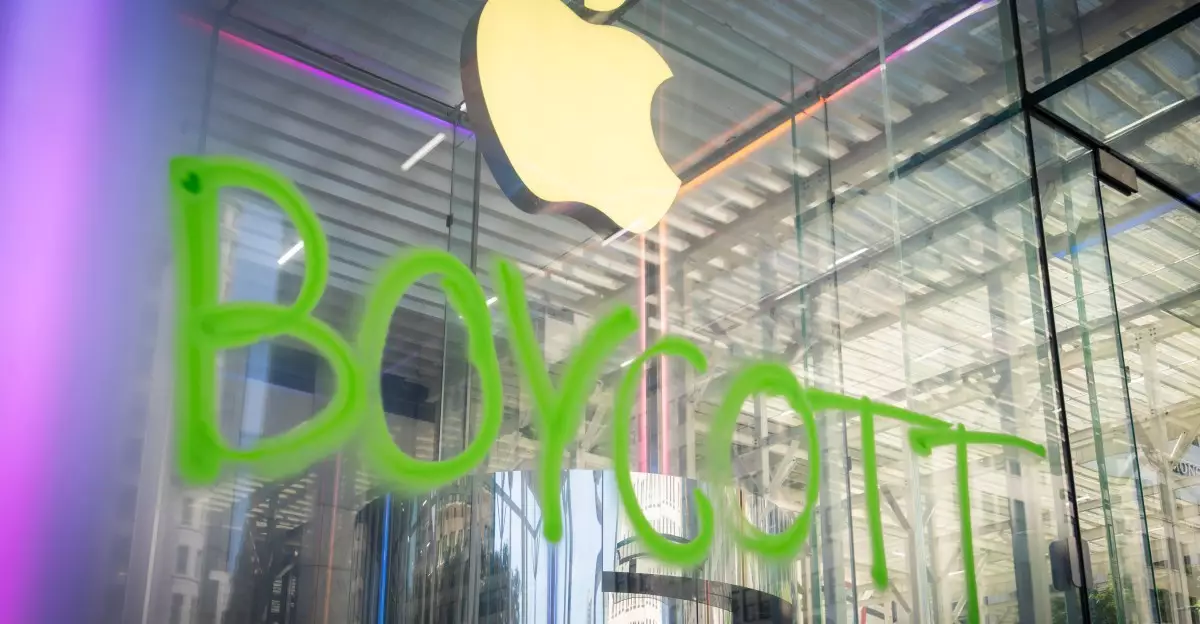In an era where corporate virtue signaling is increasingly prevalent, the actions of companies like Apple often serve as little more than superficial measures aimed at maintaining a positive public image. Despite lofty declarations of their commitment to combating climate change, these corporations consistently fall short of tangible action. The recent protests at Apple’s Fifth Avenue flagship underscore this dissonance, exposing the stark reality: big tech’s environmental rhetoric is often overshadowed by their political alliances and profit-driven motives. When Apple’s CEO Tim Cook publicly champions climate action, yet continues to support political figures undermining environmental policies, it reveals a troubling double standard. Such behavior not only erodes public trust but also perpetuates a cycle where environmental promises are used as marketing tools rather than catalysts for genuine change.
The Contradiction Between Words and Actions
Extinction Rebellion’s direct action—spray-painting slogans calling out Tim Cook and Donald Trump—serves as a stark reminder that symbolic protests are sometimes the only recourse left for citizens dissatisfied with corporate inaction. The claim that Apple supports climate initiatives while simultaneously enabling political regimes that dismantle environmental protections epitomizes this contradiction. Supporting climate gains in public statements but backing policies or political figures that actively roll back environmental standards is a form of environmental hypocrisy, one that ultimately damages the credibility of the very movements these companies claim to champion. It’s clear that surface-level commitments are insufficient when core actions continue to promote policies harmful to our planet’s future.
The Hidden Cost of Technological Growth
Beyond the political and corporate hypocrisies, there lies a more insidious issue: the environmental impact of the relentless expansion of tech industries, particularly in artificial intelligence. The recent increase in energy consumption by tech giants like Google and Microsoft signals a troubling trend. As these companies pour billions into AI innovations, they inadvertently fuel an unsustainable demand for electricity—an energy footprint that rivals or exceeds that of traditional polluters. This paradox highlights a fundamental flaw: technological advancement, often heralded as a solution to climate change, could very well become its greatest hurdle. The environmental costs of powering data centers and AI systems threaten to negate the benefits touted by these same corporations. Their refusal—or inability—to address these hidden emissions points to a broader failure in aligning digital progress with ecological sustainability.
The Power of Public Pressure and the Need for Authenticity
Protests like those staged by Extinction Rebellion serve as vital reminders that corporate accountability cannot be achieved through empty slogans alone. Grassroots activism challenges the complacency of industry giants, forcing them to confront their contradictions. When activists spray-paint messages depicting the toxicity of alliances between tech and political figures, they disrupt the sanitized narratives crafted by corporations. Society must demand more than surface-level commitments; it needs substantial action that aligns with stated values. Companies like Apple should be held to account for their political affiliations, environmental impact, and energy consumption. Only through persistent scrutiny and activism can true accountability emerge, compelling these corporations to shift from superficial promises to genuine, measurable change.
The recent protests spotlight a fundamental dilemma: the gap between what big tech companies claim and what they actually do. This disconnect not only hampers progress on pressing environmental issues but also calls into question the integrity of their leadership. Public vigilance is essential in ensuring that corporate sustainability initiatives transcend marketing schemes, urging these giants to confront their environmental and political realities head-on.


Leave a Reply